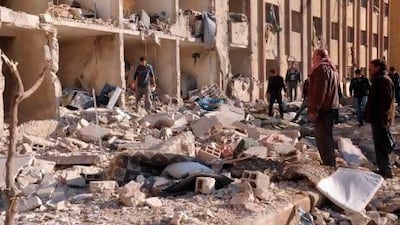DAMASCUS // Bombings at Aleppo University killed and injured dozens of people yesterday, a day after a senior Syrian government official said that the president, Bashar Al Assad, would stand in presidential elections next year.
As well as students, the university campus houses some 30,000 people who have fled parts of the city ravaged by fighting since rebels seized many neighbourhoods last July.
Some of those displaced people were among the casualties SANA reported, citing an official source.
Video footage posted online by students showed tearful survivors taking refuge in a campus building.
"So far there are 82 fatalities and more than 160 wounded in a terrorist attack that targeted students on their first day of exams at the University of Aleppo," the Aleppo Governor Mohammed Wahid Akkad told AFP by telephone.
State-run television blamed the attack on "terrorists", while opposition activists accused pro-regime forces of planting the bombs - both are familiar allegations following blasts of this type. There was no immediate claim of responsibility.
Nationwide, at least 152 people were killed yesterday, according to the Local Coordination Committees, a grassroots activists' network. The figures could not be independently verified.
Fighting continued in suburbs of Damascus, with tanks and troops moving north towards the capital.
Regime troops clashed with rebels in nearby Daraya, which was bombarded with artillery and mortar fire, something that has happened on a daily basis for months. Sana, the state news agency, said the army "inflicted heavy losses" on "terrorist groups" there and in the Ghouta region on the eastern edge of Damascus.
Daraya is a key rebel stronghold, and army officers loyal to Mr Al Assad have said it was of crucial strategic importance if government forces were to maintain their tight hold on the capital.
There was little indication that the regime's grip was loosening on Damascus. Checkpoints into the city have proliferated and journeys that once took half an hour can now last four or five hours, further choking commerce, frustrating residents and adding to the sense that central Damascus, a regime enclave, is increasingly remote from the rebellious urban sprawl surrounding it.
Inside central areas there are now power cuts and occasional bread shortages, but food and fuel is in comparative abundance if measured alongside outlying zones where rebels and regime forces have been fighting.
Syrian officials remain confident in their staying power, as was made clear in a BBC interview with the deputy foreign minister, Faisal Mekdad, broadcast on Monday,
He said it would be undemocratic if Mr Al Assad were not able to run for office next year, when the next presidential elections are scheduled.
Under a constitution introduced last year - which gave the president greater powers - future Syrian leaders are limited to two terms of office. Although Mr Al Assad is currently in his second seven-year presidential term, the rewritten constitution is not retroactive, making him technically eligible to remain in power until 2028.
"The president and many other candidates who may run will go to the people, put out their programmes and to be elected by the people," Mr Mekdad said.
"The ballot box will be the place where the future of the leadership of Syria will be decided," he added.
Proposals made by opposition groups, and supported by the West, that Mr Al Assad stand down, amounted to a coup d'etat, Mr Mekdad said.
Lakhdar Brahimi, the UN envoy for Syria who is overseeing diplomatic efforts to resolve the crisis, has called for Mr Al Assad to hand all of his powers over to a transitional government, in line with the terms of the Geneva Communique, agreed in June by the international community and Syria.
But Russia, the Syrian regime's main ally on the world stage, has said Mr Al Assad was not required by that deal to step aside - and would not do so, even if he were - while, as Mr Mekdad made clear, Syrian officials do not believe any transitional phase, or political solution, precludes Mr Al Assad from retaining his full authority.
Opposition groups, as well as many independent observers believe that Mr Al Assad is - after a war the UN says has already killed more than 60,000 people - too divisive a figure to continue as president, even if his vociferous supporters want him to.
International criticism of the Syrian regime was underscored on Monday when more than 50 countries, led by Switzerland, petitioned the United Nations Security Council to refer the crisis to the International Criminal Court (ICC), for war crimes prosecutions.
Only the Security Council has the power to request the ICC to open a formal investigation on Syria, something unlikely to happen given Russia's previous moves to block criticism of Damascus at the UN.
All the while ordinary Syrians continue to suffer. A fire broke out at a tent camp for Syrian refugees in southeastern Turkey yesterday, killing a pregnant Syrian woman and three of her children, Turkish officials said.
The fire was started by an electric heater in the family's tent at a refugee camp in Ceylanpinar, in Sanliurfa province near the border with Syria.
twitter: For breaking news from the Gulf, the Middle East and around the globe follow The National World. Follow us

